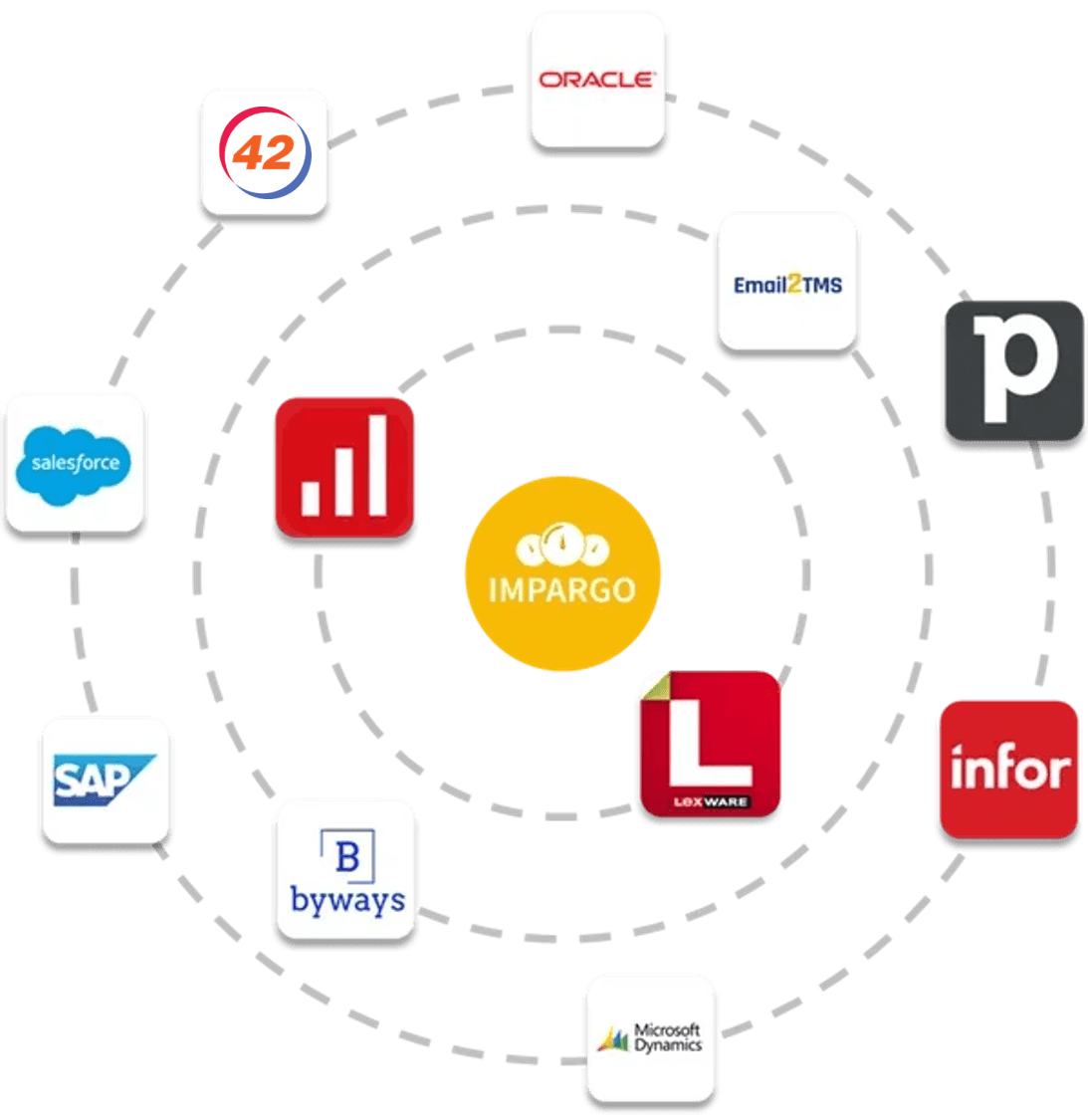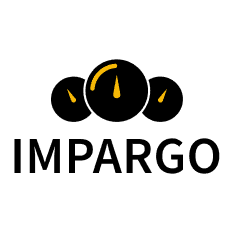If you run trucks across the EU, your day is full of slot times, tolls, eCMR, and constant calls. A Transportation Management System (TMS system) delivers real value when it connects to the tools you already use. Below is a realistic view of how integrations help dispatchers, fleet operators, and transport company owners cut empty miles, reduce paperwork, and avoid delays.
With IMPARGO’s TMS platform, orders flow in from your existing systems, routes are planned with live constraints, drivers receive clear instructions on mobile devices, and finance gets accurate data for on-time invoicing. This eliminates retyping and reduces errors.
Integrate anything: Build your own Transportation Management Platform (TMP®) with IMPARGO's road logistics solutions. Explore available integrations to streamline your daily operations.
On This Page:
- TMS and Freight Management System (FMS)
- TMS and Mobile Transportation System (MTS)
- TMS and Delivery Management System (DMS)
- TMS and Enterprise Resource Planning (ERP) System
- TMS and Third-Party Logistics (3PL) Services
- TMS and Order Management System (OMS)
- TMS and Warehouse Management System (WMS)
- TMS and Customer Relationship Management (CRM) System
- TMS and Telematics Systems
- TMS and Freight Exchanges
TMS and Freight Management System (FMS)
In daily operations, your team manages spot quotes and contract rates on Germany–Poland routes while trying to keep utilization high. A TMS system plans and executes transports, while a Freight Management System (FMS) handles brokerage tasks like rate comparison and carrier matching.
When integrated, the dispatcher can import a confirmed rate from the FMS directly into the TMS job — with the correct Incoterms, fuel surcharges, and accessorials — then assign the load within seconds. No manual data copying, no missed surcharges. IMPARGO TMS supports this handover with automated checks to prevent manual pricing errors.
TMS and Mobile Transportation System (MTS)
Drivers need clear, up-to-date instructions. A Mobile Transportation System (MTS) keeps drivers and dispatch synchronized. Connected with your TMS system, new jobs are automatically sent to the IMPARGO driver app with pickup references, pallet counts, ADR notes (if required), and real-time status updates.
If a gate time at a French DC changes, the dispatcher updates it once; the driver sees it immediately. Proofs of delivery and eCMR documents are uploaded automatically, so no information is lost.
TMS and Delivery Management System (DMS)
The last mile is demanding — tight delivery windows, limited access, and returns. A Delivery Management System (DMS) optimizes stop sequences and manages delivery confirmation. Connected with your TMS system, cross-dock departures automatically trigger DMS routes, and customers receive live ETA updates. Missed time windows appear in an exception dashboard so dispatch can react before penalties occur.
TMS and Enterprise Resource Planning (ERP) System
Finance teams need accuracy; operations teams need speed. Integrating your ERP and TMS system ensures that orders, cost centers, and VAT rules are correctly applied to each transport. When the truck unloads in Milan, the ERP receives the accrual; once the POD arrives, invoicing starts automatically — no manual data entry, fewer disputes.
Learn more about integrating ERP systems with IMPARGO TMS [here].
TMS and Third-Party Logistics (3PL) Services
Many European shippers combine in-house fleets with external 3PL capacity. Integration allows you to share loads, statuses, and documents in one platform while maintaining control of your margin and service levels. Your TMS system stays the central system of record, and partners see only what they need.
Learn more about integrating with logistics service providers [here].
TMS and Order Management System (OMS)
Customer orders come with different references, pallet exchange details, and temperature requirements. An Order Management System (OMS) integrated with your TMS system turns a confirmed order into a ready transport job with all packaging, ADR, and delivery constraints set. This lets planners focus on building profitable routes instead of formatting data.
Learn more about the IMPARGO order management system [here].
TMS and Warehouse Management System (WMS)
A common challenge: the truck is waiting, but the pallets aren’t ready. A link between your Warehouse Management System (WMS) and TMS system keeps loading and dispatch aligned. Wave picking and staging updates feed ETA and ramp planning automatically. If a trailer swap is faster than loading, the planner sees it instantly and can adjust the route.
TMS and Customer Relationship Management (CRM) System
Sales teams promise service levels; operations teams deliver them. When your CRM connects to your TMS system, account managers can access live OTIF data, claims, and lane performance before customer reviews — useful for discussing rates or service improvements.
Learn more about integrating CRM systems with IMPARGO TMS [here].
TMS and Telematics Systems
Fuel prices, tolls, and driver hours directly affect profitability. Telematics systems integrated with your TMS system provide live positions, DTCO data, temperature readings for refrigerated loads, and eco-driving insights. Dispatchers see realistic ETAs and receive alerts before a driver hours-of-service conflict causes a missed slot.
Learn more about integrating telematics systems with IMPARGO TMS [here].
TMS and Freight Exchanges
Empty kilometers reduce profitability. Integrated freight exchanges allow planners to publish available capacity directly from the TMS system and accept return loads automatically. The result: more backhauls on NL–DE–BE routes, fewer empty return trips, and better trailer utilization.
Learn more about integrating freight exchanges with IMPARGO TMS [here].

IMPARGO’s TMS system offers flexible integrations for real-world EU road freight operations — including tolls, cross-border documentation, pallet exchange, and strict delivery windows — helping small and mid-sized carriers compete efficiently with larger fleets.
Ready to Connect Your Systems?
IMPARGO TMS integrates seamlessly with your existing logistics software — from ERP and CRM to telematics and freight exchanges. Want to see it in action? Book a short consultation with our team to discover the fastest integration wins for your operations.

